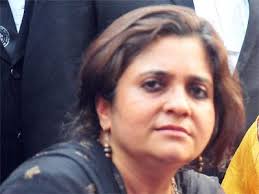New Delhi, Feb 13: Supreme Court today granted protection from arrest to social activist Teesta Setalvad and her husband for another six days in a case of alleged embezzlement of funds for a museum at Ahmedabad's Gulbarg Society that was devastated in the 2002 riots.
 The apex court said it would independently examine on the basis of FIR whether it is a case for granting anticipatory bail or not which has been denied to Setalvad and her husband.
The apex court said it would independently examine on the basis of FIR whether it is a case for granting anticipatory bail or not which has been denied to Setalvad and her husband.
"We are not going to quash the FIR," a bench comprising justices S J Mukhopadhaya and N V Ramana said.
Senior advocate Kapil Sibal, appearing for the Setalvads, said "we are also only for anticipatory bail" and all documents would be placed to satisfy that "it is not the case of custodial interrogation."
After hearing for half an hour during which Additional Solicitor General Tushar Mehta opposed the plea, the bench deferred the matter for February 19, asking the parties to place before it the Gujarat High Court judgement and other additional documents.
In the mean time, the order passed yesterday granting them interim protection, shall continue till then, the bench said.
"We will look into the allegations in the FIR mainly. Let it be very clear, we will be looking at the case not by names but like the case of any ordinary individual," it observed.
The apex court was hearing the appeal filed by the Setalvads against the yesterday's judgement of the High Court by which their plea for anticipatory bail was rejected for not co-operating with the investigation.
The High Court had also observed that Setalvads were not cooperating in the probe and that "they cannot be armoured with full fledged anticipatory bail when applicant did not cooperate with the investigation."
Setalvad and her husband have been booked by the Crime Branch of Gujarat Police on charges of cheating, breach of trust and under the IT Act, in a matter relating to the construction of "Museum of Resistance" in the Gulbarg society in Ahmedabad which was hit by communal riot in 2002.
On February 28, 2002, in the aftermath of the Godhra train burning incident, armed rioters had swooped on the Gulbarg society and killed 69 people, including former Congress MP Ehsan Jafri.






Comments
Add new comment